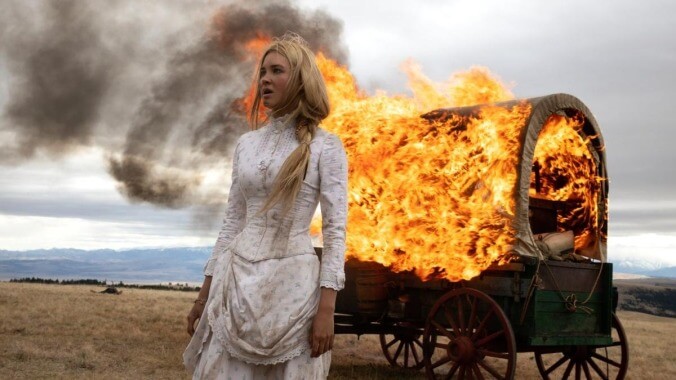Yellowstone prequel 1883 rips the rose-colored veneer off of frontier stories
Taylor Sheridan’s prequel series offers an unflinching look at the beginnings of Yellowstone’s Dutton family


The history of the American west has long been romanticized, with frontier tales centering a noble and stoic hero who’s just rough around the edges. Taylor Sheridan’s new Paramount+ series, 1883, rips the veneer off this rosy outlook and provides a raw, brutal, and riveting portrayal of what traveling west might truly have been like. The series is a prequel to Sheridan’s Yellowstone, the most popular show you’ve never seen or heard of, yet shares little connective tissue with its predecessor. While viewers will get to see John Dutton’s great-grandfather James (Tim McGraw) ride, shoot, and kick ass to protect his family, the elder Dutton is the dreamer his established great-grandson never had a chance to be.
James Dutton has big aspirations, telling his wife Margaret (played by McGraw’s wife Faith Hill) that he’ll build her a house so big she’ll get lost in it. But he has no idea where his dreams will take him—all Dutton knows is that he has to head west, away from the cruelty of humanity and the memories that still burn from the Civil War, where he was a captain for the Confederate Army.
James Dutton’s new life starts in the appropriately named Hell’s Half Acre, a district in the southern portion of Fort Worth, Texas. His introduction—after he’s robbed, Dutton knocks out one guy and shooters another in the back—offers an early glimpse at how rough life is in the Old West. While in Fort Worth, Dutton teams up with Pinkerton Agents Shea (Sam Elliott) and Thomas (LaMonica Garrett). The duo has been hired to move a group of European immigrants from Texas to Oregon and enlist Dutton to join them. Figuring there’s safety in numbers, Dutton begrudgingly agrees, although he’s more interested in protecting his family than helping others. While plans for the trip are underway, the trio quickly realize they’ve accepted a Herculean task, as the travelers they’re leading are in over their heads—not only do they lack the proper training (including horseback riding) and equipment for such a long trip, they are also painfully oblivious to the dangers that surround them.
The journey gets off to a rough start, as several of the travelers are killed early on; a brief montage shows many of them dying of snake bites, wild dog attacks, and getting sick from contaminated water. One woman loses her husband after he’s run over by a covered wagon he was trying to get out of the mud. These scenes establish how harsh this life is, a reality that links James and Shea, who are products of their environment. While this truth motivates Dutton to make a better life for his family no matter the cost, it spurs Shea to help a group of people who can’t help themselves, because feeling helpless is something he’s intimately familiar with.
When viewers first meet Elliott’s Shea, he’s sitting on the front porch of his house, his face racked with despair after losing his wife and daughter to smallpox. Strong as he is, there was nothing he could do to save them, but if he can get these travelers to Oregon safely, maybe one of them can make a difference in this terrible world that he could not.
“Death is everywhere on the prairie,” says James’ daughter Elsa (Isabel May) in one of her many voiceovers. “In every form you can imagine and from a few your nightmares couldn’t muster.” The series’ no-holds-barred look at life on the frontier can beat you over the head, but it makes the moments of light shine even brighter. Holding most of that light is Elsa Dutton; through her, we see the storylines of 1883 as full of death and danger, but also adventure and wonder.
Though coursing with heartbreak and misery, the storytelling earns its moments of levity. When Thomas and Shea good-naturedly exchange barbs, we understand their bond because we know they’ve been through hell together. When James and Margaret share a moment of intimacy, it feels authentic because we also see them bicker and count on each other. And when Elsa and a young cowboy named Ennis (Eric Nelsen) coyly flirt, we’re reminded of the sweet innocence of first love and know that it’s fleeting. This is a dangerous world and something terrible is likely to happen to one or both of them soon.
1883’s unflinching depiction of its setting and characters gives the series a sense of gravitas, which it balances with tenderness. This series displays the worst of humanity, but the series offers more than just a glimmer of hope. A blend of perseverance and optimism through backbreaking times gives 1883 the potential to be the prestige western fans of the genre have been waiting for.